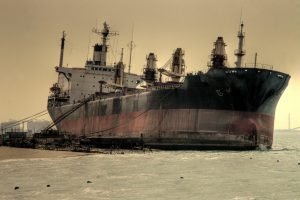In the murky world of international commerce, who is responsible for the crew and cleanup of an abandoned ship? Realistically, perhaps nobody, and that’s a problem, writes Dawn Allen in his article on the Mauritius abandoned ship disaster crisis which is published in the Legal Reader.
The Flags of Convenience That Makes It Difficult
In the same way that the excessively wealthy choose the countries with the friendliest tax policies as offshore havens for their hoarded riches, so too do international shipping companies seek out “flags of convenience.” Rather than registering in their homeland, ship owners often seek to bypass more stringent regulations, labor laws, and fees by flying the flag of a country with less onerous requirements. Unfortunately, when trouble strikes, you get what you pay for.
Flags of convenience become dramatically inconvenient if you’re the crew of an abandoned ship, or a country suddenly responsible for cleaning up someone else’s mess.
The Case Of Abandoned Ships All Over The World
Since 2004, the International Maritime Organization (IMO) received reports of 5,767 seafarers stranded on 438 ships abandoned around the world. Many are never reported, like the Rhosus.
In 2013, the MV Rhosus, a decrepit Russian-owned cargo ship flying the Moldovan flag, was arrested by Lebanese authorities for non-payment of port dues.
When the captain called for assistance, the ship’s owner, Igor Grechushkin, ghosted them, and the newly abandoned ship and stranded crew languished for nearly a year, dependent upon port authorities for necessities like food and water.
The Rhosus eventually sunk in the Port of Beirut, but the ship’s cargo – 2,750 metric tons of ammonium nitrate – was warehoused as collateral in lieu of the shipper’s debt.
That same load of ammonium nitrate exploded earlier this month, killing 220 people, injuring over 5,000, and leaving 300,000 homeless during a pandemic.
How Proper Vessel Registrations Would Help?

If Moldova had more demanding vessel registration requirements, the owner of the Rhosus may have found it harder to escape responsibility for the abandoned ship, ultimately preventing enormous destruction and loss of life in Beirut.
Danger In Red Sea
Another abandoned ship off the western coast of Yemen may soon release the world’s largest oil spill, disrupting shipping and devastating the poorest Arab state. The unfortunately named FSO Safer, a 1970s-era Japanese-built oil supertanker, is stranded in the Red Sea, taking on water and rusting away since maintenance on the vessel ceased in 2015. The Yemeni government purchased the Safer in the 1980s as a floating oil storage tank, but now the ship, and the million-plus barrels of crude oil stored in it, are in the hands of Houthi rebels. The United Nations has tried for years to unload the oil and stabilize the tanker before it explodes or sinks, but the Houthis find the ship useful as a hostage to deter attacks.
The Cruel Fate Of Seafarers
While insured, valuable cargo may be recovered from an abandoned ship, seafarers may not be so lucky. A crew of 15 has been stranded on the Spanish-flagged MV Celanova off the coast of the Philippines since February, when the ship lost its rudder. The crew discharged the tanker’s cargo of liquefied butadiene gas to another vessel in March as it ran low on the fuel needed to keep the gas cold, but now the crew waits on a ship without fuel, no air conditioning or lights, low on food and other supplies, without wages or working cell phones, miles from shore and endangering ship traffic.
A Vietnamese crew currently faces similar conditions near Malaysia, writing “Help Us. No Food No Salary” across the hull of the Viet Tin 01 oil tanker.
How Will Eliminating Flags Of Convenience Help?
Crew members may not be able to leave an abandoned ship lest they forfeit eventual claim to unpaid wages, and may not speak the local language or have the visas necessary to go ashore at all.
Living on an abandoned ship, without vital supplies, access to communication or legal assistance, in dangerous conditions, is nearly impossible.
Groups like the charity Mission to Seafarers, the International Transport Workers’ Federation union, or the IMO can help, but ultimately, ship owners and flag countries must step up to solve this persistent logistical hazard and humanitarian problem.
Eliminating “flags of convenience” won’t cure every issue presented here, but it would be a major step in the right direction.
Did you subscribe to our daily newsletter?
It’s Free! Click here to Subscribe!
Source: legal Reader
















